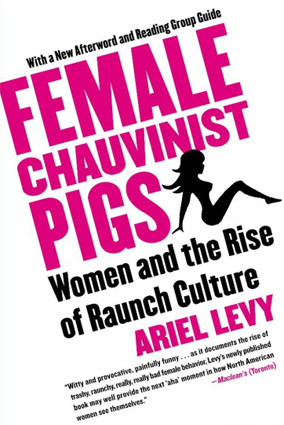|
|
 |
|
~~~~~~~~~~~~~~~~~~~~~~~~~~~~~~~~~~~~~~~~~~~~~~~~~~~~~~
With Female Chauvinist Pigs,
Ariel Levy becomes feminism's newest and most provocative voice, brilliantly laying bare the contradictions and evasions and
self-deceptions that pass for empowerment.
-Malcolm Gladwell, author of Blink and The Tipping Point

|
| FCP Author, Ariel Levy |
About the Author:
Ariel Levy
"After graduating from Wesleyan University, I worked
for Planned Parenthood, but they fired me after just one week because I am an extremely poor typist. Almost immediately thereafter,
I was hired at New York magazine. As a typist. I kept typing there for twelve years. In 2008, I became a staff writer
at The New Yorker.
"My book, Female Chauvinist Pigs, is out in paperback and has been translated into Dutch, French, Italian,
and Norwegian. I've been going to a lot of universities to talk about FCP, and I've also appeared on The Colbert Report, Oprah, and NPR's Fresh Air. I will be speaking on April 7, 2010 at Occidental College in Los Angeles."
|
 |
|

Female Chauvinist Pigs: Women and the Rise of Raunch
Culture by Ariel Levy
Reviewed by Zinta Aistars
· Paperback:
256 pages
· Publisher:
Free Press, 2006
· Price:
$14.95
· ISBN-10:
0743284283
· ISBN-13:
978-0743284288
For years, as I have watched "raunch," as Ariel Levy rightly refers to it, go
mainstream in American society, I have felt a sense of increasing discomfort and befuddlement, to say the least. In no small
part, the befuddlement was born of watching my own gender betray itself, betray the cause of working towards women's rights
in a male-dominated world. Yet I had no words for it. It was a gut feeling: this is wrong. This is nauseating. This is regression.
Even - this is to the downfall of a woman's right and wish to explore her sexuality and seek its fulfillment.
When
I saw this book's title, I immediately sensed I'd found something of importance. The day the book arrived in my mail, I sat
down and read it - all in one sitting. It's been a long time since I have done that, but my sense was correct. At long last,
I'd found the expression of that inner voice, put to coherent and rational words, ordered into a call for action. With utmost
gratitude, I say to Levy: thank you.
What is a female chauvinist pig (FCP)? "If Male Chauvinist Pigs were men who
regarded women as pieces of meat, we would outdo them and be Female Chaunvinst Pigs: women who make sex objects of other women
and of ourselves."
To Levy's credit, she readily admits, more than once, that she, too, wants to "belong," to "get
with the program," to seek acceptance among others, as is human nature to do. She observes the mainstreaming of raunch, and
women, including feminists, falling obediently into line in promoting it. "But I could never make the argument add up in my
head," she writes. "How is resurrecting every stereotype of female sexuality that feminism endeavored to banish *good* for
women? Why is laboring to look like Pamela Anderson empowering? And how is imitating a stripper or a porn star--a woman whose
*job* is to imitate arousal in the first place--going to render us sexually liberated? 'Raunchy' and 'liberated' are not synonyms.
It is worth asking ourselves if this bawdy world of boobs and gams we have resurrected reflects how far we've come, or how
far we have left to go."
As Levy describes our status quo, the trillion dollar industry of porn, the mainstreaming
of porn into everyday prime time media, the popular style of dress among our youth, promiscuity not only among youth but also
reflected in increasing incidences of infidelity (resulting in growing numbers of broken relationships) among older generations,
the quixotic chase for everlasting youth in a narrowly defined mold of feminine beauty, and the general acceptance of objectifying
women, it is difficult to see how this trend might be construed as a positive or liberating one. So why then would women become
their own worst enemy?
Somewhere along the developmental line of feminism and women's liberation, as we fought for
equal rights and opportunities, we achieved much in some areas while falling to our knees, literally and metaphorically, in
the area of female sexuality. It is the one area where we are, perhaps, most vulnerable and shown ourselves to be needy of
the approval of the opposite gender. And so, it appears, our line has become - if you can't beat 'em, join 'em. Who wants
to be viewed as a prude? Women have not gone on to explore the strength and power of the feminine gender; instead, we have
fought to "become one of the boys."
What is the definition of "sexy" that is portrayed today? Levy interviews various
nude models and popular porn stars such as Jenna Jameson to dig into the motivation behind the act. And act it is. When these
women describe what they do, not once, Levy observes, do they use the word "pleasure." The predominant descriptive word, in
fact, is "pain." The reason for doing their work? The common answer is "because I was paid to." And the predominant appearance
in these photos and flicks? It is like looking at a wall of Barbie dolls, Levy writes, "distinctly poured from the same mold.
Individuality is erased: It is not part of the formula."
If women's liberation was originally supposed to give us
greater freedom to explore our individuality, to be free to be ourselves, at any age, size, or type, how did this become an
expression of freedom for women? Quite simply, it is not.
Yet the need for a sexual revolution among women is real.
Levy states alarming statistics: 70 percent of women do not orgasm during intercourse. The percentages, in fact, are getting
higher rather than lower. If feminism was meant to be, among other things, an arena in which to develop a heightened sense
of connection for a woman to her own body, the rise of raunch is built around male fantasy rather than female fantasy, the
predominant theme being one of subjugation of the woman rather than her pleasure. Sex has become sport rather than a manifestation
of affection or even of attraction. Levy quotes the "Hite Report" from 1976, a report of female sexuality that should have
opened doors, but has become increasingly a prediction of today's abandonment of exploring what a woman really wants and needs,
dominated instead by male wants and needs: "Female sexuality has been essentially a response to male sexuality and intercourse.
There has rarely been any acknowledgment that female sexuality might have a complex nature of its own which would be more
than just the logical counterpart of male sexuality."
The mystery of the new FCP is that while she shuns "girly-girls"
from her social life, she is fixated on them for entertainment. Seeking power in the board room, she still looks to raunch
(i.e. girly-girls) when she steps out of the board room. Does this make sense? Why is womanhood still being considered as
something from which to escape, something less than manhood? As long as women emulate men in and outside of the boardroom
in how they express their strength, their smarts, and their sexuality, they are still making a statement that to be a woman
is to be inferior.
Levy explores the culture of raunch among youth, those scantily clad young women dressed as Levy
calls it, "the slut uniform," and the paradox of dressing to be gawked at and touched, even while that is the last thing these
young women crave. When asked, it is not promiscuity they crave, but acceptance, popularity among peers, and as youth will,
they are simply reflecting the raunch their parents have allowed to infiltrate mass media. One female teen expresses it this
way: "To dress the skankiest, I know that sounds terrible, but that would be the one way we [girls] compete... I wanted guys
to want me, to want to hook up with me, I guess, even though I *didn't* want to hook up with them. I always wanted the guys
to think I was the hottest one."
As a feminist, I read that statement and once again wonder, along with Levy, is this
progress? The greatest achievement for a young woman today is to be considered "hot"? To seduce, even while dreading the result
of that seduction? Because as Levy examines this line of thinking to its ugly end, these girls do, far too often, give in
to the boys who want to "hook up" to them, but rarely is sexual gratification returned. More times than not, the pleasure
is one-sided. Indeed, the girls don't even seem to want a return 'favor.' They simply want to be accepted.
This shockingly
similar attitude appears among sex workers, those women today's pop culture wishes to emulate. "The cultural dominance of
the porn-star fantasy is that it defies control. Porn stars are quite firmly under various controls. Most obviously, they
are under corporate control. Sex workers are *workers.* They are having sex... because they are paid to, not because they
are in the mood to... sex is supposed to be something we do for pleasure or as an expression of love. The best erotic models,
then, would seem to be the women who get the most pleasure out of sex, not the women who get the most money for it."
Levy
explores the theory that most sex workers are victims of sexual abuse, and finds basis for the estimates that as many as 90
percent have suffered sexual trauma, two-thirds suffer from post-traumatic stress, a number twice as high as Vietnam vets.
"There is something twisted about using a predominantly sexually traumatized group of people as our erotic role models." Even
Jenna Jameson writes, "To this day, I still can't watch my own sex scenes." In describing what she does, Jameson writes about
sex: "It was a weapon I could exploit mercilessly."
Levy concludes that the raunch culture is not a pursuit of female
sexuality, but an abandonment of it. "No matter how much porn you watch, you will end up with a limited knowledge of your
own sexuality because you still won't know how these things *feel.* That will depend on who you do them with, what kind of
mood you're in when you do, whether you feel safe or scared." Looking at porn, Levy writes, is like looking at a chart of
the food pyramid and claiming that you have enjoyed a feast.
"The proposition that having the most simplistic, plastic
stereotypes of female sexuality constantly reiterated throughout our culture somehow proves that we are sexually liberated
and personally empowered has been offered to us, and we have accepted it. But if we think about it, we know this just doesn't
make any sense. It's time to stop nodding and smiling uncomfortably as we ignore the crazy feeling in our heads and admit
that the emperor has no clothes."
I couldn't agree more with Levy, that "sex is one of the most interesting things
we as humans have to play with, and we've reduced it to polyester underpants and implants. We are selling ourselves unbelievably
short... Our national love of porn and pole dancing is not the byproduct of a free and easy society with an earthy acceptance
of sex. It is a desperate stab at freewheeling eroticism in a time and place characterized by intense anxiety. What are we
afraid of? Everything... which includes sexual freedom and *real* female power... there are other choices... options as wide
as the variety of human desire."
In her Afterword, Levy mentions "many letters from men confirming my gut feeling
that reducing sexuality to a commercial formula is no better for them than for us." One can only hope so. But, either way,
it is time for women to stop behaving like bottom-of-the-barrel men, and get back on track exploring what it means to be a
strong and competent, confidant and fully sensual woman. Now, that's revolutionary. And sexy.
|
 |
|
|
 |
|
|
 |
|
|
|
|
Feedback, submissions, ideas? Email thesmokingpoet@gmail.com
|
|
|
 |

